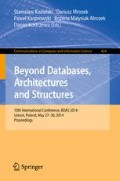Abstract
Multi-agent systems allow to build custom software solutions that work on the basis of groups of cooperating agents pursuing a common goal. In the paper, we present a universal multi-agent platform (UMAP) for .NET developers. UMAP provides ready to use interface for the implementation of software agents, leaving the programmers only the necessity to implement business logic of agents, according to the expected deliverables. UMAP is compliant with standards of the Foundation for Intelligent Physical Agents (FIPA) and unlike the popular systems, such as JADE or SPADE, it has been developed using the Microsoft .NET Framework. In the paper we show architecture of the UMAP, communication and message transport system, agent cataloging and management services, and runtime environment. The platform is available for free from: http://zti.polsl.pl/dmrozek/umap.htm
Access this chapter
Tax calculation will be finalised at checkout
Purchases are for personal use only
Preview
Unable to display preview. Download preview PDF.
References
Abril, J., Comellas, F., Cortés, A., Ozón, J., Vaquer, M.: A multiagent system for frequency assignment in cellular radio networks. IEEE Transactions on Vehicular Technology 49(5), 1558–1565 (2000)
Balaji, P., Srinivasan, D.: Multi-agent system in urban traffic signal control. The IEEE Computational Intelligence Magazine 5(4), 43–51 (2010)
Bellifemine, F., Caire, G., Poggi, A., Rimassa, G.: JADE, A White Paper, http://jade.tilab.com/papers/2003/WhitePaperJADEEXP.pdf (accessed February 02, 2014)
Burczyński, T., Poteralski, A., Szczepanik, M.: Genetic generation of 2-d and 3-d structures. In: Proc. of the Second M.I.T. Conference on Computational Fluid and Solid Mechanics, pp. 1–10, Massachusetts Institute of Technology, Cambridge (2003)
Choiński, D., Nocoń, W., Metzger, M.: Multi-agent system for hierarchical control with self-organising database. In: Nguyen, N.T., Grzech, A., Howlett, R.J., Jain, L.C. (eds.) KES-AMSTA 2007. LNCS (LNAI), vol. 4496, pp. 655–664. Springer, Heidelberg (2007)
Ferber, J.: Multi-Agent System: An Introduction to Distributed Artificial Intelligence. Addison Wesley Longman, Harlow (1999)
FIPA-OS: Developers Guide, http://fipa-os.sourceforge.net/docs/Developers_Guide.pdf (accessed on February 02, 2014)
FIPA Standard: FIPA Agent Management Specification, http://www.fipa.org/specs/fipa00023/ (accessed on February 02, 2014)
FIPA Standard: FIPA Communicative Act Library Specification, http://www.fipa.org/specs/fipa00037/ (accessed on February 02, 2014)
FIPA Standard: FIPA Message Structure Specification, http://www.fipa.org/specs/fipa00061/ (accessed on February 02, 2014)
Lau, H., Wong, V.: An immunity-based distributed multi-agent control framework. IEEE Transactions on System, Man and Cybernetics - Part A 36(1), 91–108 (2006)
Małysiak-Mrozek, B., Momot, A., Mrozek, D., Hera, Ł., Kozielski, S., Momot, M.: Scalable system for protein structure similarity searching. In: Jędrzejowicz, P., Nguyen, N.T., Hoang, K. (eds.) ICCCI 2011, Part II. LNCS, vol. 6923, pp. 271–280. Springer, Heidelberg (2011)
Momot, A., Małysiak-Mrozek, B., Kozielski, S., Mrozek, D., Hera, Ł., Górczyńska-Kosiorz, S., Momot, M.: Improving performance of protein structure similarity searching by distributing computations in hierarchical multi-agent system. In: Pan, J.-S., Chen, S.-M., Nguyen, N.T. (eds.) ICCCI 2010, Part I. LNCS, vol. 6421, pp. 320–329. Springer, Heidelberg (2010)
Mrozek, D., Małysiak, B., Augustyn, W.: Agent-supported protein structure similarity searching. In: Ghose, A., Governatori, G., Sadananda, R. (eds.) PRIMA 2007. LNCS, vol. 5044, pp. 49–61. Springer, Heidelberg (2009)
Mrozek, D., Małysiak-Mrozek, B., Mikołajczyk, J., Kozielski, S.: Database under pressure - testing performance of database systems using universal multi-agent platform. In: Gruca, A., Czachórski, T., Kozielski, S. (eds.) Man-Machine Interactions 3. Advances in Intelligent Systems and Computing, vol. 242, pp. 637–648. Springer, Heidelberg (2014)
Nan-Peng, Y., Chen-Ching, L., Price, J.: Evaluation of market rules using a multi-agent system method. IEEE Transactions on Power Systems 25(1), 470–479 (2010)
Nwana, H.: Software agents: An ovierview. Knowledge Engineering Review 11(3), 1–40 (1996)
Padgham, L., Winikoff, M.: Developing Intelligent Agent Systems: A Practical Guide. Halsted Press, New York (2004)
Popa, H., Pop, D., Negru, V., Zaharie, D.: Agentdiscover: A multi-agent system for knowledge discovery from databases. In: Proc. of the International Symposium on Symbolic and Numeric Algorithms for Scientific Computing, SYNASC, pp. 275–282 (2007)
Poteralski, A., Szczepanik, M., Ptaszny, J., Kuś, W., Burczyński, T.: Hybrid artificial immune system in identification of room acoustic properties. Inverse Problems in Science and Engineering 21(6), 957–967 (2013)
Shoham, Y., Leyton-Brown, K.: Multiagent Systems: Algorithmic, Game-Theoretic, and Logical Foundations. Cambridge University Press (2009)
SPADE2: Project home page, http://code.google.com/p/spade2/ (accessed on February 02, 2014)
Tan, V., Yoo, D., Shin, J., Yi, M.: A multiagent system for hierarchical control and monitoring. J. UCS 15(13), 2485–2505 (2009)
Tumer, K., Agogino, A.: Improving air traffic management with a learning multiagent system. IEEE Intelligent Systems 24(1), 18–21 (2009)
Wooldridge, M.: An Introduction to Multiagent Systems, 2nd edn. John Wiley & Sons (2009)
XMPP: technology overview, http://xmpp.org/about-xmpp/technology-overview/ (accessed on February 02, 2014)
Zarandi, M., Avazbeigi, M., Turksen, I.: An intelligent fuzzy multi-agent system for reduction of bullwhip effect in supply chains. In: Proc. of the IEEE Annual Meeting of the North American Fuzzy Information Processing Society, NAFIPS, pp. 1–6 (2009)
Author information
Authors and Affiliations
Corresponding author
Editor information
Editors and Affiliations
Rights and permissions
Copyright information
© 2014 Springer International Publishing Switzerland
About this paper
Cite this paper
Mrozek, D., Małysiak-Mrozek, B., Waligóra, I. (2014). UMAP - A Universal Multi-Agent Platform for .NET Developers. In: Kozielski, S., Mrozek, D., Kasprowski, P., Małysiak-Mrozek, B., Kostrzewa, D. (eds) Beyond Databases, Architectures, and Structures. BDAS 2014. Communications in Computer and Information Science, vol 424. Springer, Cham. https://doi.org/10.1007/978-3-319-06932-6_29
Download citation
DOI: https://doi.org/10.1007/978-3-319-06932-6_29
Publisher Name: Springer, Cham
Print ISBN: 978-3-319-06931-9
Online ISBN: 978-3-319-06932-6
eBook Packages: Computer ScienceComputer Science (R0)

